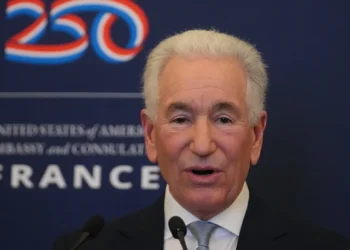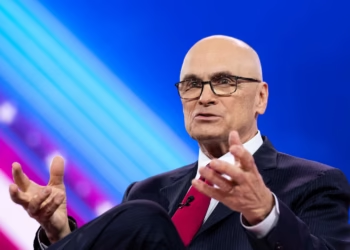DELHI (Realist English). Under the leadership of Narendra Modi, India’s ruling Bharatiya Janata Party (BJP) has not merely continued the neoliberal project—it has transformed the relationship between the Indian state and its capitalist classes. While critics often focus on the BJP’s authoritarianism and cronyism, historian Vanessa Chishti contends the real novelty lies elsewhere: in the regime’s successful consolidation of big capital and its ability to restructure India’s fractured bourgeois order.
In a sweeping analysis of India’s political economy, Chishti—who teaches history at O.P. Jindal Global University and researches the evolution of modern Kashmir—explores how the BJP has moved beyond the coalition politics that constrained its predecessors and redefined class relations through a combination of centralization, state patronage, and targeted economic reform.
“The BJP’s ability to push the interests of big capital—against the inertia of rival factions and the electoral power of rural classes—is unprecedented in post-independence India,” Chishti argues.
From fragmented capitalism to hegemonic alignment
India’s capitalist class has long been fragmented: comprising industrial giants, region-bound manufacturers, agrarian capitalists, and a vast sea of small-scale producers operating in the informal economy. Historically, no political party—not even the dominant Indian National Congress (INC)—succeeded in aligning these interests under one national project. The INC’s rule, held together by patronage and compromise, began to unravel in the 1960s as agrarian and regional capitalists defected.
What the BJP has accomplished since 2014—and solidified through its 2019 and 2024 electoral victories—is the subordination of small and agrarian capital to the imperatives of big capital, often at the cost of its own traditional voter base among traders and small manufacturers.
“The BJP has broken decisively from its roots as a party of small capital and refashioned itself as the primary political vehicle of India’s industrial bourgeoisie,” Chishti notes.
Big capital’s moment — and its limits
Backed by corporate media, financial conglomerates, and monopolists in infrastructure, energy, and telecom, the BJP has slashed welfare programs, enacted long-desired labor law reforms, and overseen an aggressive privatization campaign. It has written off billions in corporate bad debts and absorbed risk through state banks—what Chishti calls a system of “riskless capitalism.”
Yet this consolidation faces structural constraints.
India’s rural sector, agrarian elites, and informal economy—which accounts for 90–95% of livelihoods—remain politically potent. Despite attempts to reduce their leverage through tax reforms like the Goods and Services Tax (GST) and deregulation of agricultural markets, the BJP has faced pushback, most notably during the 2020–21 farmers’ protests, where it was forced to repeal a major set of agricultural laws.
“The BJP has streamlined the policy environment in favor of big capital, but the rural sector remains too large, too embedded in the electoral calculus to be ignored,” Chishti observes.
Centralization as a tool of class consolidation
A hallmark of the Modi era has been political and fiscal centralization, undermining India’s asymmetric federalism and curbing state governments’ ability to provide off-budget subsidies or circumvent central tax rules. The GST, for instance, limits subnational discretion over fiscal policy and consolidates capital accumulation pathways at the national level.
Yet, paradoxically, the decentralized nature of land regulation and the political autonomy of state governments—even in BJP-ruled states—continue to provide space for regional capitalists and agrarian elites to resist complete alignment with big industrial interests.
The Congress and the collapse of bourgeois compromise
By contrast, the Congress Party—once the default party of Indian capital—has lost its role as a broker between competing capitalist factions. The INC’s coalition-era governance (2004–2014) failed to implement reforms demanded by corporate India while alienating rural partners with its inability to rein in inflation and sustain populist transfers.
The tipping point came with the passage of the Land Acquisition Act (2013), which, under pressure from anti-displacement movements, curtailed the ability of corporations to cheaply seize land. For many industrialists, this marked the final rupture with Congress.
“Big capital’s desertion of the INC—and its strategic embrace of the BJP—completed a historic shift in Indian bourgeois leadership,” Chishti argues.
Patronage as policy: The enduring logic
Despite ideological differences, both the BJP and INC have governed through patronage. What distinguishes the BJP is its ability to discipline rival factions and restructure patronage to serve accumulation by large industrial firms. This has included redirecting subsidies, state procurement contracts, and public investment to sectors favored by the party’s corporate backers.
Even as public sector disinvestment slowed under Congress due to left-wing opposition, the BJP has accelerated it, often without parliamentary scrutiny.
“The Modi government has not abandoned patronage; it has simply rationalized and centralized it in ways that advantage the most powerful actors in Indian capitalism,” Chishti explains.
The unresolved contradiction
Despite its dominance, the BJP cannot escape the core contradiction of India’s political economy: the tension between capital accumulation and democratic legitimacy. Universal suffrage continues to empower classes that capitalist transformation threatens to displace—small farmers, informal workers, and petty producers.
“The contradiction between economic liberalization and mass democracy hasn’t disappeared,” Chishti warns. “It has only been managed more aggressively—through cultural nationalism, coercion, and centralization.”


















